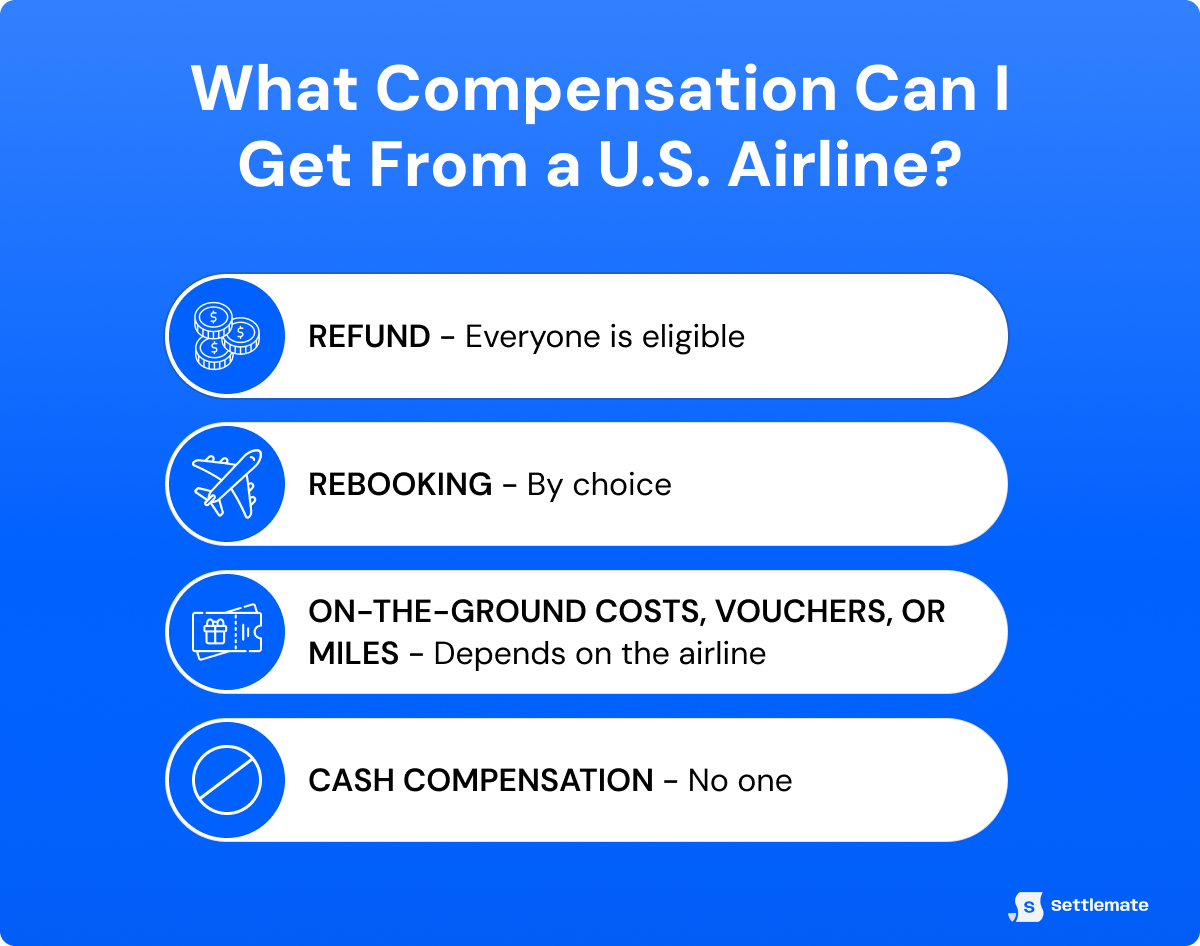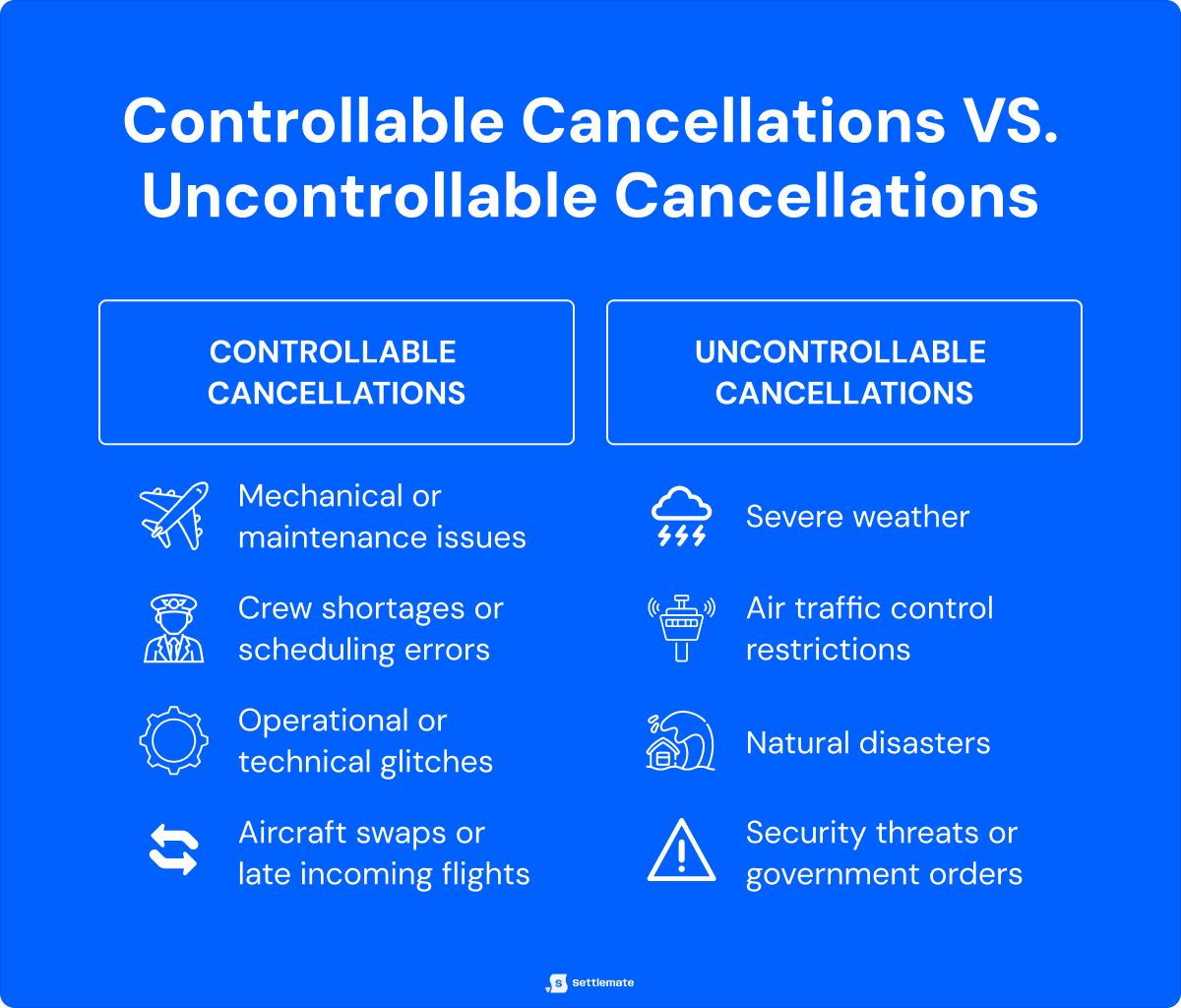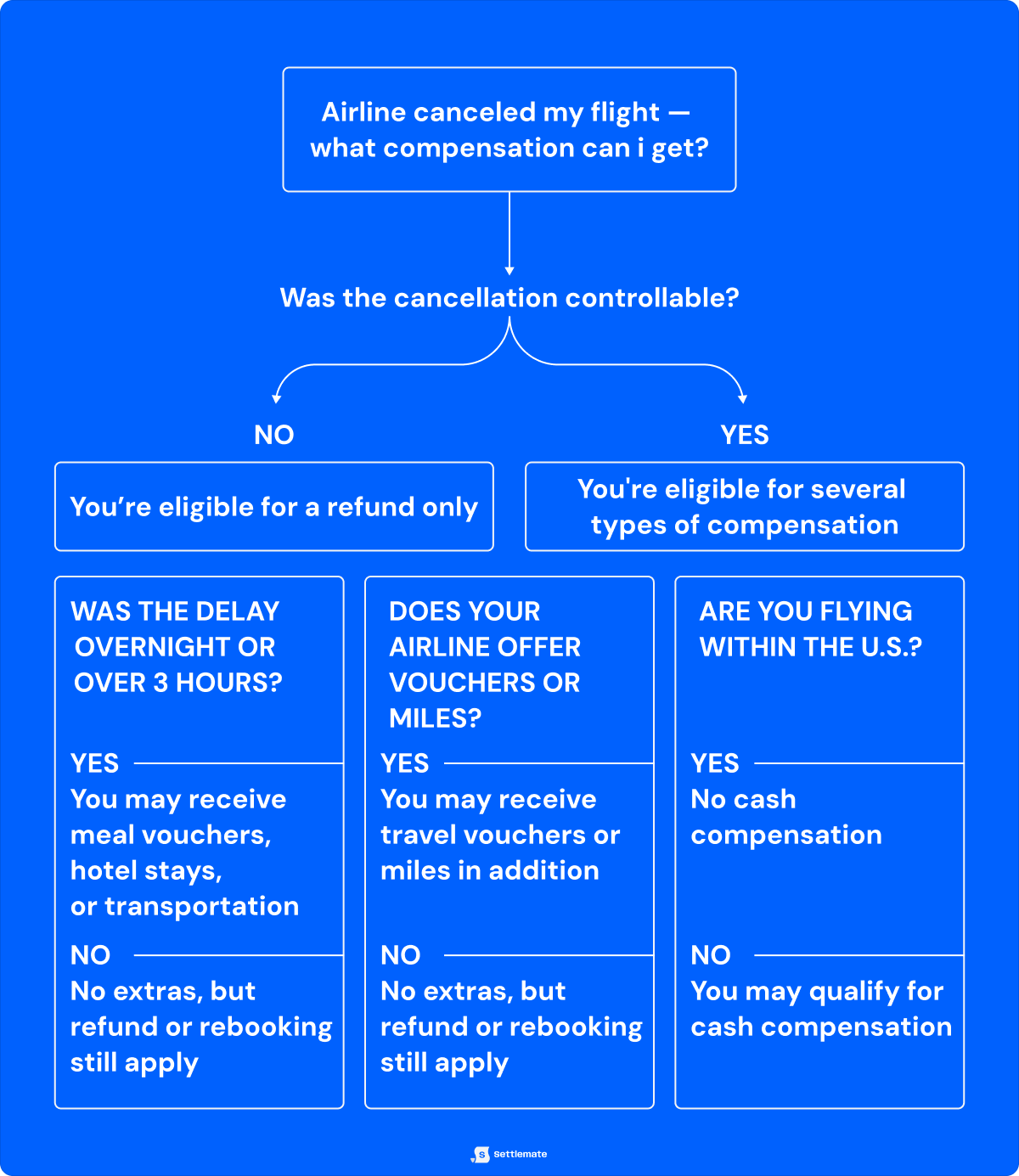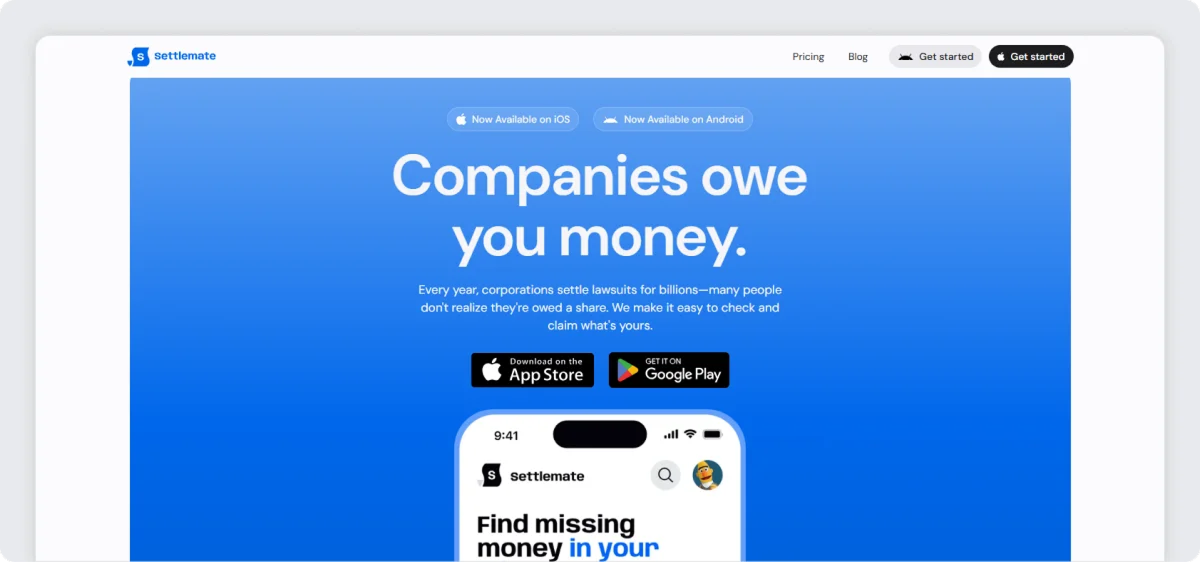You’ve booked the trip, packed your bags, and counted down the days. Then, an email pops up with four frustrating words: “Your flight is canceled.”
A similar scenario played out for almost 100,000 passengers in 2024 whose flights were canceled by major U.S. airlines. Like tens of thousands of them at the time, you’re probably wondering the same thing: What now?
Though it’s perfectly understandable to fire off a few frantic calls and messages when an airline cancels your flight, compensation should be the very next thing on your mind.
This guide explains what kind of compensation you can expect, what it depends on, and how to claim it quickly.
Key takeaways
- You’re always entitled to a refund when your flight is canceled
Regardless of the reason or ticket type, U.S. airlines must issue a full cash refund if you choose not to take the rebooked flight. The refund should be automatic, prompt, and returned in your original form of payment. - Most airlines offer rebooking, but it’s voluntary
While not legally required, major carriers like Delta, United, and American usually rebook passengers on the next available flight at no extra cost. This can be a good option if you still plan to travel and want to avoid paying higher fares later. - Extra perks depend on the airline and situation
Some airlines cover meals, hotels, and transport if the cancellation was within their control. A few even offer vouchers or miles as goodwill. Always check the airline’s customer service plan to see what you can claim. - Your route and payment method can make a difference
Flights that touch the EU may qualify for additional cash compensation under EU 261 rules. And if your airline doesn’t step up, travel insurance or premium credit cards can reimburse costs like meals, hotels, or portions of your airfare. - Settlemate makes sure your refund actually arrives
Even automatic refunds can fall through the cracks. Settlemate tracks, verifies, and files your refund claims automatically, so you never miss the money you’re owed.
5 types of compensation you can receive after a canceled flight
In legal situations, like insurance or lawsuit claims, compensation almost always means one thing: money in your account.
So it’s no surprise that many travelers’ first question after a cancellation is, “Will I get paid for this?” And after spending money on non-refundable hotels and tours and taking time off work, this is a fair question.
But financial compensation is only one form of what you might receive when an airline cancels your flight.
Let’s look at all the main types of compensation airlines offer and what each one actually means for you.
1. Refund
If an airline cancels your flight, you’re getting a full refund—no questions asked.
It doesn’t matter why the flight was canceled, which class you booked, or whether the ticket was refundable. The only thing that can stop that refund is choosing to accept a rebooked flight instead.
If you reject the offer—or if you simply ignore it—the airline is required to issue your refund automatically.
The refund should also be:
- Prompt: You should receive it within seven business days if you paid by credit card, or 20 calendar days if you paid by cash or check.
- In your original form of payment: Airlines can’t replace your refund with a voucher or credit unless you explicitly agree to it.
2. Rebooking
The U.S. Department of Transportation (DOT) only requires airlines to provide a refund if your flight is canceled. That’s the legal baseline.
Still, most major U.S. airlines, like Delta, United, and American, go a step further by offering to rebook you on another flight at no additional cost.
This can be the airline’s next available flight or, in some cases, a partner airline flight if it helps you reach your destination sooner.
Here’s how rebooking usually works:
- You get a rebooking offer by email, text, or app notification soon after the cancellation.
- The airline automatically assigns you to the next flight or gives you a few options to choose from.
- If you still want to travel, simply accept the booking within the provided deadline.
Rebooking is a good option if you still want to reach your next destination soon, since it saves you from potentially paying a higher fare later.
3. On-the-ground costs
Finding out your flight has been canceled is never a small inconvenience, especially if this happens on the day you’re supposed to travel.
That’s why many airlines offer to cover certain on-the-ground costs when a cancellation leaves the passenger stranded.
The table below shows what this usually looks like:
4. Vouchers or miles
In rare cases, airlines might offer travel vouchers or frequent flyer miles when a cancellation leaves you waiting for hours.
How rare are those cases?
As of now, only two major U.S. airlines offer both: Alaska Airlines and Hawaiian Airlines.
Here’s what these options mean:
- Travel vouchers: Coupons for future flights with the same airline, usually matching the value of your canceled ticket.
- Frequent flier miles: Loyalty points added to your account that can later be redeemed for flights, upgrades, or other travel perks like free checked bags.
Vouchers and miles make sense if you plan to fly with the same airline in the near future. But if your plans are uncertain, a refund is the smarter choice.
5. Cash compensation
Finally, the big question: Can you get extra cash when your flight gets canceled?
Sadly, the answer is no—at least not if you’re flying with a U.S. airline.
No U.S. law currently requires airlines to pay additional money beyond refunds, even when the cancellation is entirely their fault.
There were efforts to change that, with the Biden administration proposing new rules that would’ve required airlines to pay passengers between $200 and $775, depending on the circumstances of the cancellation. But this proposal never became law, and the system remains unchanged.

4 key factors that your compensation depends on
Now that you know the different types of compensation you can receive after a canceled flight, let’s look at key factors that determine which of them you actually qualify for.
1. Reason for cancellation
While there are plenty of reasons an airline might cancel your flight, they generally fall into two main categories: controllable and uncontrollable cancellations.
Controllable flight cancellations
Controllable cancellations are caused by something the airline could’ve prevented with better planning or maintenance, such as:
- Mechanical or maintenance issues: The aircraft experienced a non-weather-related problem that required repair.
- Crew shortages or scheduling errors: The airline failed to provide enough qualified crew to operate the flight.
- Operational or technical glitches: Issues with baggage handling, fueling, or internal systems disrupted the schedule.
- Aircraft swaps or late inbound flights: The plane assigned to your route was delayed or reassigned due to airline logistics.
- Cleaning or catering delays: Ground operations took longer than expected, pushing the schedule past legal crew limits.
When a cancellation is controllable, the airline is generally expected to take care of the affected passengers, with the exact form of compensation depending on the carrier’s customer service plan.
Uncontrollable flight cancellations
Uncontrollable cancellations are caused by factors often referred to as force majeure events. These include:
- Severe weather (e.g., storms, hurricanes, or poor visibility)
- Air traffic control (ATC) restrictions (e.g., government-imposed flight holds or reroutes)
- Natural disasters (e.g., wildfires, earthquakes, and volcanic ash)
- Security or safety threats (e.g., terrorism, bomb scares, or emergency evacuations)
- Government orders or border closure
These cancellations don’t force airlines to provide any additional amenities or compensation, though you can still get a refund if you choose not to travel via an alternate flight.

The bottom line is that refunds are guaranteed if the airline cancels your flight and you choose not to take the rebooked option, no matter the reason. However, extra compensation or perks usually apply only for controllable cancellations.
2. Airline policy
Every airline has its own refund policy and customer service plan—documents that spell out what the carrier promises to do when flights get delayed or canceled.
In practice, these policies determine how far an airline will go beyond the basic refund rules. For you, it means how well you’ll be treated after your flight gets scrapped.
Here’s what you can expect from major U.S. airlines:
3. Route
When it comes to compensation eligibility, where and how you’re flying matters, especially if you’re traveling internationally.
While the U.S. system won’t force airlines to pay you extra cash for cancellation, other regions might.
For example, under the European Union 261 regulation, passengers may be entitled to significant cash compensation when their flight is canceled or arrives severely delayed. This applies to:
- Flights departing from any EU airport, regardless of the airline’s nationality
- Flights operated by an EU-based airline arriving in the EU from outside the region
- Flights to and from Iceland, Norway, and Switzerland
If your canceled flight falls under any of these categories, you might be able to claim cash compensation, assuming the cancellation was controllable. The compensation ranges from $300 to $600, depending on the flight distance.
You should always check the relevant compensation rules for the region you’re traveling to, since your rights can vary depending on where your flight starts, where it ends, and which airline operates it.
4. Your method of payment or coverage
If your airline drops the ball, your payment method or travel-insurance protections can step in where the airline’s policy and legal obligations end.
Typically, travel insurance policies cover:
- Trip cancellation or interruption
- Extra lodging or meals when your flight is delayed or canceled
- Coverage for non-refundable prepaid expenses, such as hotel, tours, or cruise connections
However, you should always read the fine print since some policies don’t include airline-initiated cancellations, even when they’re controllable.
As for credit cards, many premium travel cards include built-in protection benefits that can save you hundreds of dollars when things go wrong.
Cards like the Chase Sapphire Preferred and Amex Platinum often provide coverage for trip delays, cancellations, and interruptions, provided you used them to pay for your flight or travel arrangements in full. But keep in mind that even premium cards have coverage limits, which means you might not be reimbursed for the full ticket cost.
Airline canceled my flight: Compensation flowchart
To make all these rules easier to follow, here’s a quick flowchart that shows what compensation or support you can expect based on your situation.

How to claim your airline refund with Settlemate
Refunds from canceled flights are supposed to be automatic, but between missing emails, expired vouchers, and processing delays, a significant amount of money never actually reaches travelers.
Settlemate steps in to track, verify, and claim all the refunds you’re legally owed.
It fits right into the refund process by automating many of the steps travelers often overlook:
- Instant refund matching: Settlemate finds canceled or significantly changed flights that qualify for a refund.
- Auto-filled forms: The app completes and submits refund requests correctly right away, saving hours of guesswork.
- Real-time tracking: You can see the status and timing of every refund, so you always know what’s pending.
- Deadline reminders: You get alerts before refund windows close, preventing missed payouts.
Plus, Settlemate goes beyond flights, tracking other money that companies owe you, from class action settlements to product recalls.
Download Settlemate on the App Store or Google Play today and make sure every refund you earn is a refund you receive.

FAQ
Are you entitled to compensation if your flight is canceled?
In the U.S., you’re entitled to a full refund if your flight is canceled and you choose not to take the rebooked option, no matter the reason or ticket type.
However, you’re not entitled to extra cash compensation like in Europe. Some airlines may voluntarily offer meal vouchers, hotel stays, or travel credits if the cancellation was within their control, but those perks aren’t legally required.









